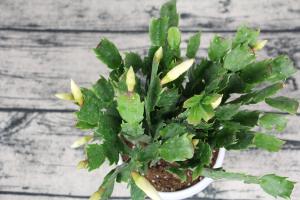Introduction
Tomatoes are an essential crop in vegetable gardens, and planting companion plants with them can benefit the growth and health of the entire crop. Companion planting is a technique that involves planting different plants close to each other to create a more balanced and harmonious ecosystem. Companion planting with tomatoes can help reduce pests, improve soil quality, and increase yields. In this article, we will explore the best plants to plant with tomatoes for a robust and healthy garden.
Companion Plants for Tomatoes
1. Basil: Basil is a popular companion plant for tomatoes as it helps repel pests like aphids and mosquitoes. It also adds a pleasant aroma to the garden and can improve the flavor of tomatoes when planted nearby. Basil is easy to grow, and its roots grow shallowly, making it a good companion plant for tomatoes.
2. Marigolds: Marigolds are another great companion plant for tomatoes. They release a chemical that repels nematodes, which can damage the roots of tomatoes. Marigolds also attract beneficial insects like butterflies and bees, which are essential for pollination. They are easy to grow and add a bright pop of color to the garden.
3. Carrots: Carrots can help improve the soil quality in the garden when planted with tomatoes. They release nutrients into the soil that tomatoes can use, and their long roots can help improve soil aeration. Carrots also attract beneficial insects like ladybugs and lacewings, which can help control pests.
4. Garlic and onions: Garlic and onions can help repel pests like aphids and spider mites when planted near tomatoes. They also release sulphur compounds into the soil, which can help improve soil quality. Garlic and onions are easy to grow and have a long shelf life, making them a popular companion plant for tomatoes.
5. Nasturtiums: Nasturtiums are an excellent companion plant for tomatoes as they attract beneficial insects like bees and butterflies. They also serve as a trap crop for pests like whiteflies and aphids, attracting them away from the tomato plants. Nasturtiums have edible flowers and leaves, making them a versatile and beautiful addition to any garden.
Plants to Avoid Planting With Tomatoes
While many plants can benefit from being planted with tomatoes, some plants should be avoided as they can compete for nutrients or attract harmful pests. Some of the plants to avoid planting with tomatoes include:
1. Nightshades: Tomatoes belong to the nightshade family and should not be planted with other nightshade plants like peppers, eggplants, and potatoes. These plants can compete for nutrients and space, leading to stunted growth and reduced yields.
2. Brassicas: Brassicas like broccoli, cauliflower, and cabbage should not be planted with tomatoes as they can attract pests like aphids and whiteflies. These pests can then spread to the tomato plants and cause damage.
3. Fennel: Fennel should not be planted near tomatoes as it can have a negative effect on their growth. Fennel releases a chemical that can stunt the growth of tomato plants and reduce yields.
4. Corn: Corn can attract pests like tomato fruitworms, which can cause significant damage to tomato plants. Corn can also compete for nutrients and space, leading to reduced yields.
5. Walnut trees: Walnut trees release a chemical called juglone that can be toxic to tomato plants. Avoid planting tomatoes near walnut trees or where they have grown before.
Conclusion
Companion planting with tomatoes can benefit the growth, health, and yield of your garden. By planting companion plants like basil, marigolds, carrots, garlic, onions, and nasturtiums, you can improve soil quality, reduce pests, and attract beneficial insects. However, it is essential to avoid planting nightshades, brassicas, fennel, corn, and walnut trees with tomatoes as these can compete for nutrients or attract harmful pests. By using companion planting techniques, you can create a more balanced and harmonious garden and enjoy fresh and delicious tomatoes all season long.

 how many times do yo...
how many times do yo... how many planted tre...
how many planted tre... how many pine trees ...
how many pine trees ... how many pecan trees...
how many pecan trees... how many plants comp...
how many plants comp... how many plants can ...
how many plants can ... how many plants and ...
how many plants and ... how many pepper plan...
how many pepper plan...































